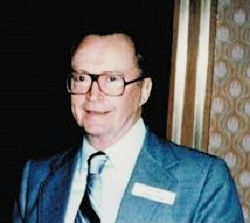|
Norman L. Smith Hamilton, ON Canada QCWA # 10783 Chapter 73 |
 |
Norman Lloyd Arthur Smith 1917-1995
Norman Smith had a long love affair with radio.
A ham operator in 1932, a commercial op in many remote postings throughout the Depression years, a Merchant Marine shipboard radio officer for three years in the Second World War, he continued to enjoy radio contacts, as VE3BK, up to the time of his death, of a sudden heart attack, in 1995.
It at all started in Montreal, where Norman Smith was born in 1917 and where he became a radio amateur in 1932 with the callsign 2JN. Armed also with a commercial ticket, he was employed throughout the Depression years as a radio operator in a variety of remote locations in Canada including Chibougamau, in northern Quebec, and Anticosti Island in the St.Lawrence River.
When war was declared in September 1939, Norman Smith tried to enlist but the armed forces did not require his services at that time. As a civilian, he soon found himself helping to train radio operators on Toronto Island and then at Malton Airport as part of the British Commonwealth air training plan.
It was during this period that he met and married his wife, June. She was working in Toronto as a registered nursing assistant. Appropriately, June became a June bride : they were married June 21, 1941.
In 1942, it appeared that the armed forces, by now hungry for manpower, might force him to exchange his Morse key for a rifle. Norman Smith, with help and advice from a Toronto radio inspector, decided he could make better use of his talents as a shipboard operator in the Merchant Marine. He was directed to a ship that needed a "Sparks" immediately and sailed from the east coast into the thick of the battle of the Atlantic. A later posting took him to the west coast, and his voyages included one to India. He was later to say that he almost made it around the world in two trips.
His wife still treasures his letters written during these voyages. Even though they were subject to heavy censorship they were filled with vivid descriptive detail. Sometimes a clever correspondent was able to outfox the censor. In those days, of course, it was forbidden to reveal any details of ships' locations and where their voyages might be taking them . But June and Norman both knew that June had a brother in India, so when Norman wrote that he hoped to be seeing June's brother soon, June knew that his ship was headed for the sub continent.
After the war, June and Norman moved to Hamilton, and Norman embarked on a busy new career as a technician servicing sound equipment in movie theatres throughout southwestern Ontario, a range that took him throughout the Niagara peninsula and as far north as Tobermory.
The couple's only child, a daughter, was born in 1951.
Norman remained an active amateur operator and a member of the Hamilton Amateur Radio Club despite his busy schedule. He was a regular at Field Day, usually on 80 CW. At home RTTY became a favorite mode. When computers and packet radio arrived on the scene Norman also became involved in those modes.
Long-time friend Bob Wilson, VE3CIB, still chuckles at the jokes they used to play on June when they arrived home from a ham radio flea market and pretended they had a trunk-full of "boat anchors" which would be unloaded into the basement later.